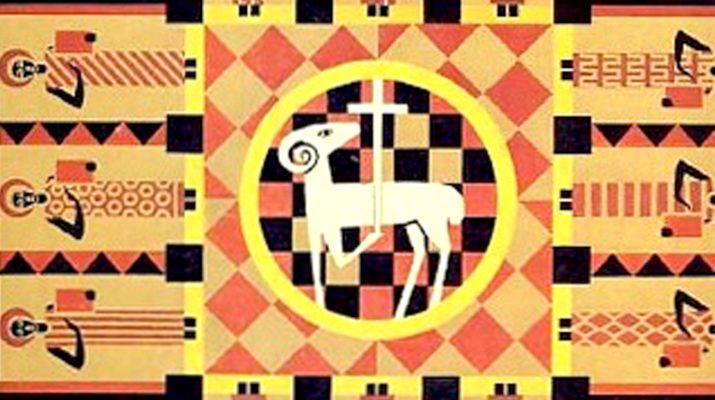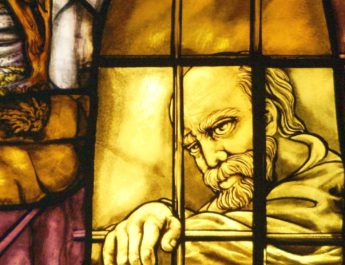John 1:29-42
Second Sunday after Epiphany A
29 The next day he sawA JesusB comingC toward him and declared,D
A “saw” = blepo. This is literally to see – it is primarily used in the physical sense. However, figuratively it can be seeing, which includes attention and so to watchfulness, being observant, perceiving, and acting on the visual information. It can also mean beware.
B “Jesus” = Iesous. From Hebrew Yehoshua (Joshua, the Lord is salvation); {from YHVH (proper name of the God of Israel; the self-existent and eternal one); {from havah (to become) or from hayah (to come to pass, become, be)} + yasha (to deliver, defend, help, preserve, rescue; properly, to be open, wide or free, which implies being safe. So, in a causative sense, this is to free someone)}. This is Jesus or Joshua in Greek – the Lord saves or the Lord is salvation.
C “coming” = erchomai. This is to come or go.
D “declared” = lego. This is to speak, say, name, call, command. It is generally to convey verbally.
“HereE is the LambF of GodG who takes awayH the sinI of the world!J
E “here” = idou. From eido (to be aware, see, know, remember, appreciate). This is see! Lo! Behold! Look! Used to express surprise and or draw attention to the statement.
F “Lamb” = amnos. 4x in NT. This is lamb, used figuratively for innocence or in reference to its sacrificial use. Usually, it refers to a lamb that is one year old.
G “God” = Theos. From Proto-Indo-European origins, meaning do, put, place. This is God or a god in general.
H “takes away” = airo. This is to lift up in a literal or figurative sense. So, it could mean to lift, carry, or raise. It could also imply lifting something in order to take it away or remove it. Figuratively, this can be used for raising the voice or level of suspense. It can mean sailing off as raising the anchor. It can also correspond to a Hebrew expression for atonement of sin (lift/remove sin).
I “sin” = hamartia. From hamartano (to miss the mark, do wrong, make a mistake, sin); {from a (not) + meros (a part or share)}. Literally, this means not having one’s share or portion – like not receiving inheritance or what was allotted to you. This word means missing the mark so it is used for guilt, fault, and acts of sin.
J “world” = kosmos. Perhaps from the base of komizo (to carry, convey, recover); from komeo (to take care of). This is order, the world, the universe, including its inhabitants. Literally, this is something that is ordered so it can refer to all creation. It can also refer to decoration in the sense that something is better ordered and, thus, made more beautiful. This is where “cosmos” and “cosmetics” come from.
30 This is he of whom I said, ‘After me comes a manK who ranks ahead of meL because he was beforeM me.’ 31 I myself did not knowN him, but I came baptizingO
K “man” = aner. This is man, male, husband, or fellow. It can also refer to an individual.
L {untranslated} = ginomai. This is to come into being, to happen, become, be born. It can be to emerge from one state or condition to another or is coming into being with the sense of movement or growth.
M “before” = protos. From pro (before, first, in front of, earlier). This is what is first, which could be the most important, the first in order, the main one, the chief.
N “know” = eido. Related to “here” in v29. See note E above.
O “baptizing” = baptizo. From bapto (to dip or dye; to entirely cover with liquid, to stain). This is to submerge, wash, or immerse. Used specially for baptism.
with waterP for this reason, that he might be revealedQ to Israel.”R
P “water” = hudor. Perhaps from huetos (rain); from huo (to rain). This is water literal or figurative. It is one of the roots that “hydrogen” and “hydroelectric” come from.
Q “revealed” = phaneroo. From phaneros (visible, apparent, clear, shining); from phos (light, a source of light, fire, or radiance; light with specific reference to what it reveals; luminousness whether natural or artificial, abstract or concrete, literal or figurative); from phao (to shine or make visible, especially with rays of light); from the same as phaino (to bring light, cause to appear, shine, become visible or clear). This is to make visible or clear, to make known. Properly, it is to illumine and so to make apparent or bring into open view.
R “Israel” = Israel. From Hebrew Yisrael (God strives or one who strives with God; new name for Jacob and for his offspring); {from sarah (to persist, exert oneself, contend, persevere, wrestle, prevail) + el (God or god)}. This is Israel the people and the land.
32 And JohnS testified,T “I sawU the SpiritV
S “John” = Ioannes. Related to “Jesus” in v29. From Hebrew yochanan (Johanan); from Yehochanan (“the Lord has been gracious”); {from YHVH (see note B above) + chanan (beseech, show favor, be gracious; properly, to bend in kindness to someone with less status). This is John, meaning “the Lord has been gracious.”
T “testified” = martureo. From martus (a witness whether having heard or seen something; witness literally, judicially, or figuratively; by analogy, a martyr). This is to bear witness, testify, give evidence. It is to testify in a literal or figurative sense.
U “saw” = theaomai. From thaomai (to gaze at a spectacle; to look at or contemplate as a spectator; to interpret something in efforts to grasp its significance). This is to behold, look upon, see, contemplate, visit like a spectator. This is the root of the word “theatre.”
V “Spirit” = pneuma. From pneo (to blow, breathe, breathe hard). This is wind, breath, or ghost. A breeze or a blast or air, a breath. Figuratively used for a spirit, the human soul or part of us that is rational. It is also used supernaturally for angels, demons, God, and the Holy Spirit. This is where pneumonia comes from.
descendingW from heavenX like a dove,Y and it remainedZ on him.
W “descending” = katabaino. From kata (down, against, throughout, among) + baino (to walk, go). This is to come down whether from the sky to the ground or from higher ground to lower. It can be used in a literal or figurative sense.
X “heaven” = ouranos. May be related to oros (mountain, hill); probably related to airo (raise, take up, lift, remove). This is the air, the sky, the atmosphere, and heaven. It is the sky that is visible and the spiritual heaven where God dwells. Heaven implies happiness, power, and eternity.
Y “dove” = peristera. 10x in NT. This is dove or pigeon.
Z “remained” = meno. This is to stay, remain, wait, await, continue, abide, endure. It can mean to literally stay in a place or to remain in a condition or to continue with hope and expectation.
33 I myself did not know him, but the one who sentAA me to baptize with water said to me, ‘He on whom you seeBB the Spirit descend and remain is the one who baptizes with the HolyCC Spirit.’ 34 And I myself have seenDD and have testified that this is the Chosen One.”EE
AA “sent” = pempo. This is to send, put forth, or dispatch. This often refers to a temporary errand. It is sending someone with a focus on the place they departed from. By contrast, another Greek word, hiemi, emphasizes the destination and yet another word, stello, focuses on the motion that goes with the sending.
BB “see” = horao. To see, perceive, attend to, look upon, experience. Properly, to stare at and so implying clear discernment. This, by extension, would indicate attending to what was seen and learned. This is to see, often with a metaphorical sense. Can include inward spiritual seeing.
CC “Holy” = hagios. From hagnos (holy, sacred, pure ethically, ritually, or ceremonially; prepared for worship, chaste, unadulterated, pure to the core; undefiled by sin; figurative for innocent, modest, perfect). God is totally different from humanity and thus set apart. That which is consecrated to worship God (elements of worship) or to serve God (as the saints) are holy because they are now set apart for God’s purposes. Holy because important to God. This is sacred physically, pure. It can be morally blameless or ceremonially consecrated.
DD “seen” = horao. Same as “see” in v33. See note BB above.
EE “Chosen One” = huios + ho + Theos. Literally, “Son of God.” Huios is son, descendant – a son whether natural born or adopted. It can be used figuratively for other forms of kinship. Theos is the same as “God” in v29. See note G above.
35 The next day John again was standingFF with twoGG of his disciples,HH 36 and as he watchedII
FF “standing” = histemi. This is to stand, place, establish, appoint, stand ready, be steadfast.
GG “two” = duo. This is two or both.
HH “disciples” = mathetes. From matheteuo (to make a disciple of); from manthano (to learn key facts, gain knowledge from experience; generally implies reflection as part of the learning process); from math– (thinking things through). This is a disciple, learner, or student. It is where we get “mathematics” from.
II “watched” = emblepo. Related to “saw” in v29. 12x in NT. From en (in, on, at, by, with) + blepo (see note A above). This is to look at, gaze, consider, stare, see clearly, look with particular interest.
Jesus walk byJJ he exclaimed,KK “Look,LL here is the Lamb of God!” 37 The two disciples heardMM him say this, and they followedNN Jesus.
JJ “walk by” = peripateo. From peri (about, concerning, around, encompassing) + pateo (to read, trample on; to trample literally or figuratively); {from patos (trodden) OR from paio (to strike, smite, sting; a hit like a single blow)}. This is to walk. Going from Hebrew figurative language, to walk referred to how you conducted your life, how you chose to live. This word is most literally walking around. Figuratively, it is living, behaving, following, how you occupy yourself. This is where “peripatetic” comes from.
KK “exclaimed” = lego. Same as “declared” in v29. See note D above.
LL “look” = idou. Same as “here” in v29. See note E above.
MM “heard” = akouo. This is hear or listen, but it also means to understand by hearing. This is where the word “acoustics” comes from.
NN “followed” = akoloutheo. From a (with, fellowship, union) + keleuthos (road, way). This is to accompany or follow someone, especially the way a disciple does.
38 When Jesus turnedOO and sawPP them following, he saidQQ to them, “What are you looking for?”RR
OO “turned” = strepho. From trope (turning, shifting, a revolution; figuratively, a variation); from trepo (to turn). This is to turn, change, turn back, be converted; to turn around completely to take the opposite path or a completely different one.
PP “saw” = theaomai. Same as “saw” in v32. See note U above.
QQ “said” = lego. Same as “declared” in v29. See note D above.
RR “looking for” = zeteo. This is to seek, search for, desire. It is searching for something by inquiring or investigation. It can be seek in a literal or figurative sense. There is a Hebrew figure of speech “to seek God’s face” so it can also mean to worship God. Alternately, you could seek someone’s life i.e. plot to kill them.
They said to him, “Rabbi”SS (which translatedTT meansUU Teacher),VV “where are you staying?”WW
SS “Rabbi” = Rhabbi. 15x in NT– 8x in the Gospel of John. From Hebrew rab (chief); from rabab (to be many, increase, multiply). This is a title of respect for a teacher-scholar. Literally, it means great one or honorable sir. It can also be understood as my master or my teacher.
TT “translated” = methermeneuo. 8x in NT. From meta (with, among, beyond) + hermeneuo (to interpret, translate, explain the meaning of); {perhaps from Hermes, the god of language and a proper name}. This is to explain beyond i.e. to translate or interpret.
UU “means” = lego. Same as “declared” in v29. See note D above.
VV “Teacher” = didaskalos. From didasko (to teach, direct, instruct, or impart knowledge; in the New Testament, almost always used for teaching scripture); from dao (to learn). This is teacher or master.
WW “staying” = meno. Same as “remained” in v32. See note Z above.
39 He said to them, “Come and see.”XX They came and sawYY where he was staying, and they remained with him that day.ZZ It was about four o’clock in the afternoon.AAA
XX “see” = horao. Same as “see” in v33. See note BB above.
YY “saw” = horao. Same as “see” in v33. See note BB above.
ZZ “day” = hemera. Perhaps from hemai (to sit). This is day, time, or daybreak.
AAA “four o’clock in the afternoon” = hora…dekatos. Literally, “the hour was about the tenth.” Hora is a set time or period, an hour, instant, or season. This is where the word “hour” comes from. Dekatos is 3x in NT. From deka (ten). This is tenth.
40 OneBBB of the two who heard John speak and followed him was Andrew,CCC SimonDDD Peter’sEEE brother.FFF
BBB “one” = heis. This is one, a person, only, some.
CCC “Andrew” = Andreas. Related to “man” in v30. 13x in NT. From aner (see note K above). This is Andrew, meaning manly.
DDD “Simon” = Simon. From Hebrew Shimon (Simon – Jacob’s son and his tribe); from shama (to hear, often implying attention and obedience). This is Simon, meaning “he who hears.”
EEE “Peter’s” = Petros. Related to petra (large rock that is connected and or projecting like a rock, ledge, or cliff; can also be cave or stony ground). This is Peter, a stone, pebble, or boulder.
FFF “brother” = adelphos. From a (with, community, fellowship) + delphus (womb). This is a brother in a literal or figurative sense. It is also used of another member of the Church.
41 He firstGGG foundHHH hisIII brother Simon and said to him, “We have found the Messiah”JJJ (which is translated Anointed).KKK
GGG “first” = protos. Related to “before” in v30.
HHH “found” = heurisko. This is to find, learn, or obtain. It is to discover something, which generally implies a period of searching for it. This is to find in a literal or figurative sense. This is where the word “heuristic” comes from.
III “his” = idios. This is something that belongs to you or that is personal, private, apart. It indicates a stronger sense of possession than a simple possessive pronoun. This is where “idiot” comes from (denoting someone who hasn’t had formal training or education and so they rely on their own understanding).
JJJ “Messiah” = Messias. 2x in NT – both in John. From Hebrew mashiach (the anointed or consecrated one; a king, priest, or saint); from mashach (to smear or anoint; to run oil on, to consecrate). This is Messiah or Anointed One.
KKK “Anointed” = Christos. From chrio (consecrate by anointing with oil; often done for prophets, priests, or kings). Literally, the anointed one, Christ. The Greek word for Messiah.
42 He broughtLLL Simon to Jesus, who lookedMMM at him and said, “You are Simon son of John. You are to be calledNNN Cephas”OOO (which is translatedPPP Peter).
LLL “brought” = ago. This is lead, bring, carry, guide, drive, go.
MMM “looked” = emblepo. Same as “watched” in v36. See note II above.
NNN “called” = kaleo. Related to keleuo (to command, order, direct); from kelomai (to urge on). This is to call by name, invite, to name, bid, summon, call aloud.
OOO “Cephas” = Kephas. 9x in NT. From Aramaic kepha (stone or rock). This is Cephas, the Aramaic translation of Peter’s name.
PPP “translated” = hermeneuo. Related to “translated” in v38. 3x in NT. See note TT above.
Image credit: “Lamb of God” by Father George Saget, Senegal, 1963.




